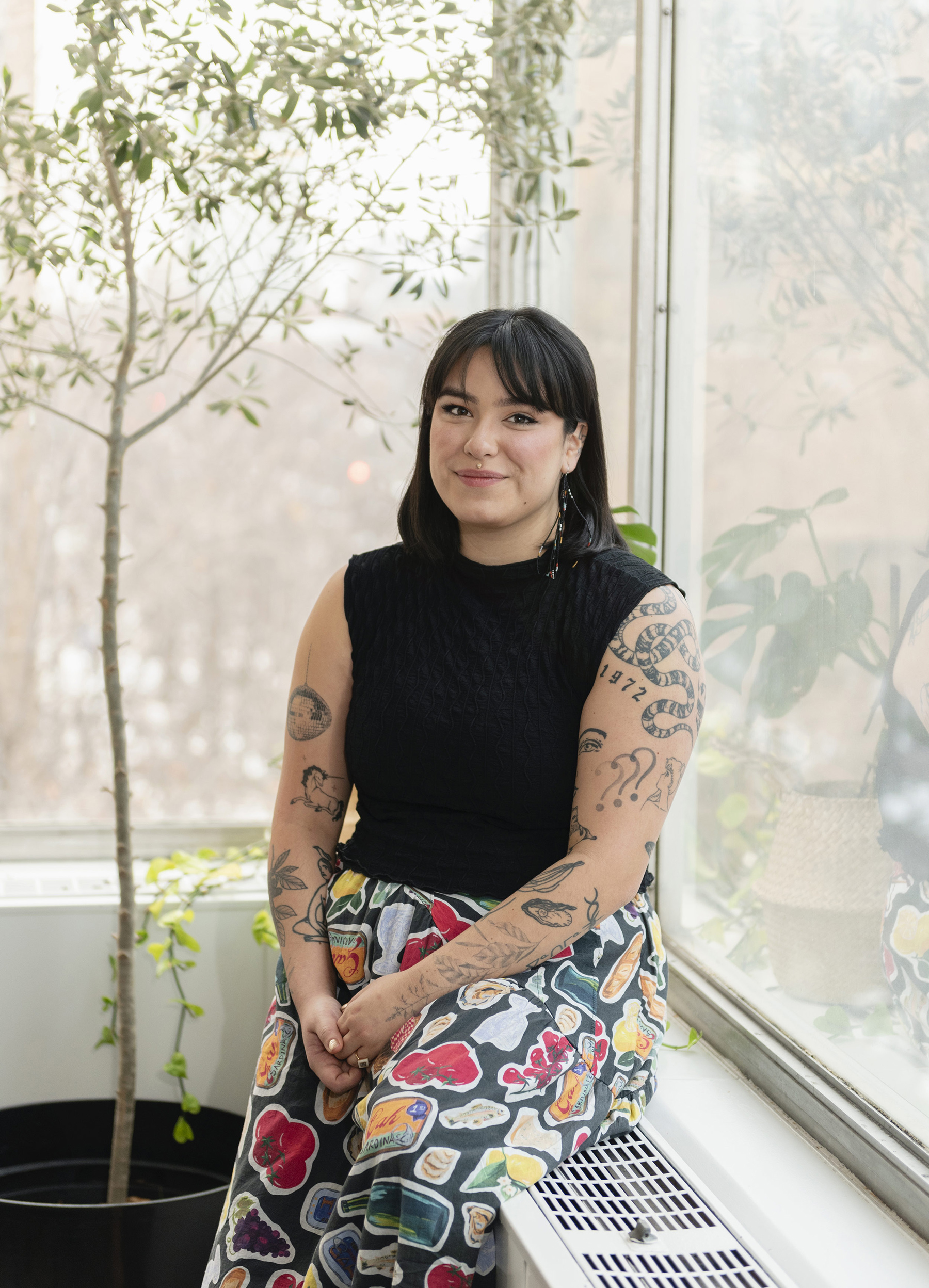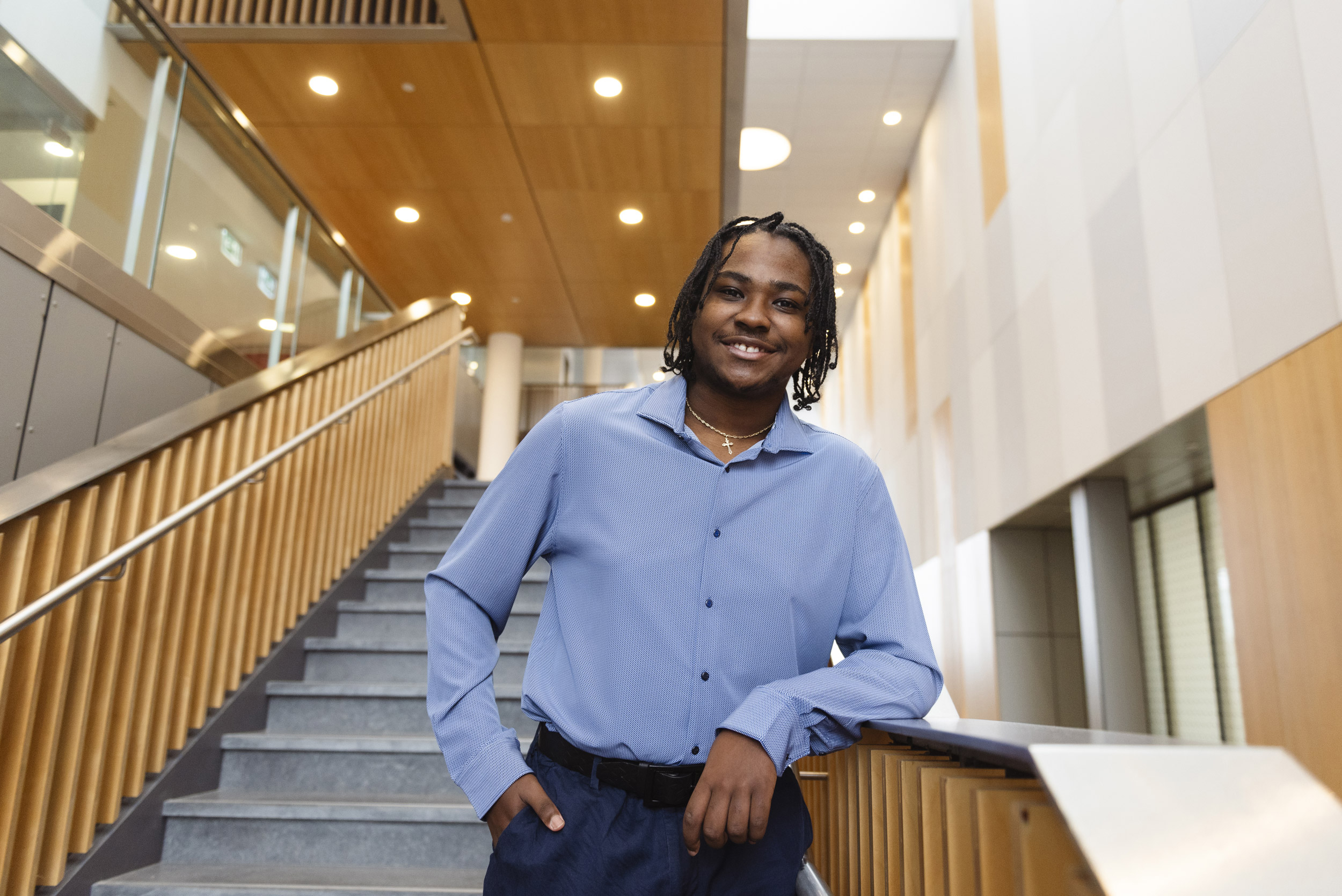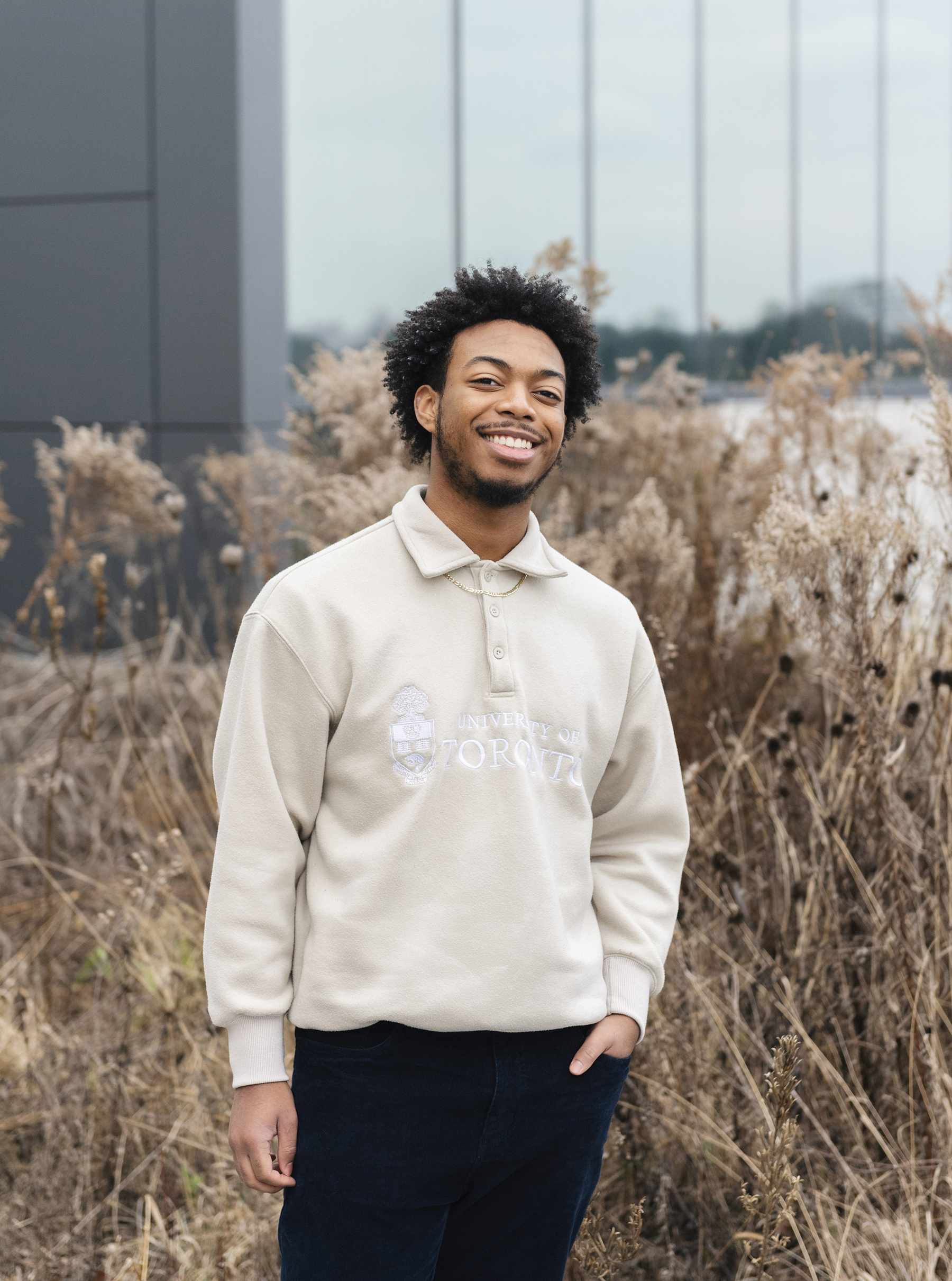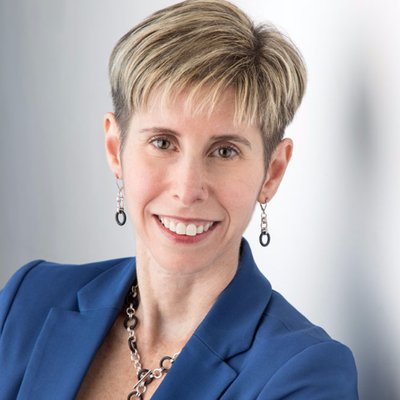In the 1960s, students marched for civil rights; in the ‘80s, they protested South African apartheid. Today, many students are calling for action on the climate crisis and social injustice, using the internet platforms they grew up with to connect with like-minded peers and rally strangers to their cause.
Like the three students profiled below, they are often motivated by personal experience. Riley Yesno, an Indigenous activist and PhD student at the University of Toronto, draws on her family’s experience to imagine a better tomorrow for Indigenous Peoples in Canada. “The work I’m doing is about my future, my siblings’ future – everybody I love,” she says.
Read below how Yesno and fellow U of T students De-Mario Knowles and Giovanni Williams are helping to move the needle – online and in the real world – on the issues that matter to them most.
How “good” is Canada?
Not nearly as good as we think we are – and we can be much better, says Riley Yesno
On stage at Toronto’s St. Lawrence Centre for the Performing Arts, Riley Yesno is making the case that Canada is not actually a “good” country.
It’s a claim many of the 200 people gathered for her TEDx Talk may not have heard before. An Anishinaabe activist and scholar, Yesno argues that only by minimizing – or completely overlooking – the harms this country has perpetuated against Indigenous peoples, could we think of ourselves as “good.” How else to account for Canadians’ sunny self-perception, considering the forced placement of 150,000 children into abusive, culture-erasing residential schools? And the ongoing underinvestment in Indigenous communities. And the disproportionate level of violence against Indigenous women.

To actually live the ideal of an inclusive, good place, we must first listen to – and act on – what Indigenous voices are telling us, says Yesno, a Vanier Scholar who is completing a PhD in Indigenous and Canadian politics at U of T.
It’s a big, society-changing kind of message that draws from Yesno’s own experience as a member of the Eabametoong First Nation. Her paternal grandparents were torn away from their families and made to attend residential schools for a decade. Growing up in a home on a Northern Ontario reserve, she recalls dirty tap water and mould growing on the walls.
She initially thought she could make a difference by serving on the Prime Minister’s Youth Council from 2017 to 2019, but says she felt unheard and ineffective. She found that publicly speaking about her story and the broader tale of Indigenous oppression in Canada to be more powerful. At the 2018 Stockholm Forum on Gender Equality, she spoke about Canada’s epidemic of missing, murdered and imprisoned Indigenous women. That same year at the UN Climate Change Conference in Poland, she shared how Indigenous traditions of living harmoniously with the land can help advance environmental stewardship.
In April, Yesno will deliver a lecture on CBC radio about the “landback” Indigenous movement, a cause she has championed since joining with other young Indigenous activists who embrace social justice goals beyond government apologies and land recognition recitations.
“It’s putting away this idea of, ‘We’re going to wait for Canada’s permission to decide whether or not we can get land back,’ and we’re just going to do it anyway,” Yesno says. “It’s any sort of action that aims to put power, jurisdiction, authority and resources back in the hands of Indigenous Peoples.”
The work I’m doing is about my future, my siblings’ future – everybody I love.”
Her articles on this and other Indigenous topics have appeared in many well-known journals and media sites including The Toronto Star, Maclean’s and the CBC. She is currently writing a book about her involvement in grassroots Indigenous movements to decolonize Canada.
As a means of advocacy, she gravitates to writing. It allows her ideas to live on, to be shared widely and, she hopes, to inspire others. “This is one of the gifts of writing,” she says. “My thinking is fundamentally influencing other people’s thinking…it’s moving something in people.”
As Yesno continues to strive for equality and social justice for Indigenous peoples in Canada, she hopes her efforts ultimately will create more opportunities for the next generation. “How can this be better,” she asks. “How can we be more?”
“I realized that my words could help people feel understood”
De-Mario Knowles is using video to help his peers at U of T Scarborough understand the mental health supports available to them

As U of T Scarborough students navigate the stresses that can arise from schoolwork, the rising cost of living and our uncertain times, De-Mario Knowles wants them to know they are not alone.
A few months ago, the second-year clinical psychology student began collaborating with the university’s Health and Wellness Centre to produce The Mental Health Minute – a series of brief videos that aim to raise awareness about the department’s services. The three videos released so far explain the benefits of participating in one-on-one counselling, how to connect with a counsellor, nurse or physician; and the services available for international students.
This desire to help his fellow students was borne out of Knowles’ own journey with mental health challenges. He says he grew up “feeling like I never really belonged in any type of community.”
That changed three years ago when Knowles, who has Cree heritage, felt inspired to write a poem about the importance of discussing mental health in society and ending the stigma of mental illness. He posted it on Instagram, and it attracted private messages from friends and others saying that his poem had brought them solace and strength. “I realized that my words could actually help people feel understood,” he says. “It showed me my purpose.”
This sense of wanting to advocate for improved mental health awareness and supports led Knowles to become involved with Step Above Stigma, a charity that encourages young adults to question societal norms that say they are “unworthy” and act as barriers to their mental wellness. Earlier this year, he delivered a keynote address at its community event, where he spoke about the importance of self-affirmations for success.
At U of T Scarborough, Knowles supports students in diverse ways. In the psychology department’s Authentic Learning Lab, he is the Indigenous creative development lead – a role in which he ensures that Indigenous characters, ways of life and experiences of colonialism are represented in a digital education game being developed about privilege, oppression and social justice.
Among Knowles’ role models is former U.S. first lady Michelle Obama. He particularly appreciates her insights about the importance of being vulnerable in order to meaningfully connect with others. “That resonates with me greatly,” he says. “I try to implement vulnerability in everything I do, as a way to inspire people. I realize that’s how I can connect with people on a different level.”
If you see it, you can be it
Giovanni Williams wants Black teens to feel that they belong at U of T Mississauga

Each week, Giovanni Williams, a first-year student at U of T Mississauga, mentors four Black youths who attend Grade 12 at local high schools. They come to campus to learn about university life as part of Support, Engage, Experience University of Toronto Mississauga (SEE UTM), an initiative designed to make the campus more accessible to Black community members, who have been historically underrepresented in higher education. The four-month program engages participants in a course in critical thinking for STEM learning, a campus co-op placement and mentorship by a current student. “This initiative is about equity, it’s levelling the playing field by raising up Black people,” Williams says.
At his weekly meetings with the group, Williams answers their questions about the day-to-day experience of attending university, such as managing classwork, navigating the campus social scene and living in residence. They also share their fears about having grades that are high enough to qualify for U of T. Williams tries to put them at ease by explaining the nuances of GPA requirements, and offers tips on how to write about their strengths and experiences in their university application forms. “I try to comfort them and tell them about my own experience applying to UTM,” he says.
Williams’ journey to the campus was shaped by his own participation in SEE UTM. He hadn’t considered attending university, partly because none of his four older brothers had. Also, his high school had streamed him into applied courses, which he took to mean he was college bound. That changed when he excelled in Grade 9 and subsequently shifted into academic courses. He now views the streaming decision as rooted in racial bias, which he internalized. “There are a lot of barriers that keep pushing us down,” he says.
For Williams, SEE UTM helped him overcome these barriers by enabling him to understand that he, too, has a place in university. What was especially beneficial, he says, was the constant guidance and support of his mentor, who told him about her experience in criminology studies. She even attended his SEE UTM graduation ceremony. “She showed me how I could be confident in my skin as a Black person,” he says. “She would ask about my life and where I was struggling in class assignments, and give me advice on how to improve. I felt like I had someone who actually cared for me and wanted to see me grow.”
I want the mentees to feel they have someone they can confide in. By being their mentor, I get the joy of seeing them progress and grow.”
She also introduced him to the places and activities frequented by Black students, which made him realize, “I’m not the only one here.”
That supportive mentorship experience is what inspired Williams to become a SEE UTM mentor. Following what he observed from his own mentor’s practices, he aims to incorporate ice-breaker games and other interactive elements into his mentorship duties, which include leading tours of different campus sites, and delivering workshops on topics such as budgeting, campus facilities and scholarships. Most importantly, he says, he strives to foster the same close rapport with his mentees.
“I want the mentees to feel they have someone they can confide in,” he says, adding that the biggest satisfaction of being their mentor is “I get the joy of seeing them progress and grow.”




2 Responses to “ The Change They Want ”
Thank you for this article. In a world in which many of our current leaders are descending into the darkness of hate, anger and discord, it helps to know that there is a younger generation of leaders who are carrying the flame of equity and inclusion into the future.
What amazing young leaders! Your words and actions are motivating others to change, which is needed in our world. Keep instilling hope in those you meet.